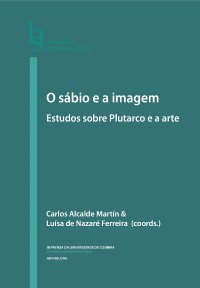Please use this identifier to cite or link to this item:
https://hdl.handle.net/10316.2/36455| DC Field | Value | Language |
|---|---|---|
| dc.contributor.author | Alcalde Martín, Carlos | |
| dc.date.accessioned | 2015-04-17T10:46:53Z | |
| dc.date.accessioned | 2020-09-11T11:22:53Z | - |
| dc.date.available | 2015-04-17T10:46:53Z | |
| dc.date.available | 2020-09-11T11:22:53Z | - |
| dc.date.issued | 2014 | - |
| dc.identifier.isbn | 978-989-26-0933-1 | |
| dc.identifier.isbn | 978-989-26-0934-8 (PDF) | |
| dc.identifier.uri | https://hdl.handle.net/10316.2/36455 | - |
| dc.description.abstract | The numerous references to the arts that abound in the works of Plutarch reveal his vast knowledge and appreciation of the matter, but he refrains from making aesthetic assessments and the references to the plastic arts are always subordinated to the purpose of the context and of the work in which they are found. For Plutarch, works of art are inferior to those that result from a statesmen’s virtue. Nevertheless as the former are a product of reason and not of chance, he considers them as worthy and adequate enough to be used as an instrument of moral education and political instruction. According to him, statesmen should not be authors themselves of any work of art, but he applauds the fact that they know how to appreciate them ‑ as long as no pretentiousness or indulgence is displayed ‑ as a demonstration of his paideia, especially when it comes to the Roman protagonists of his Lives. | eng |
| dc.description.abstract | Las numerosas referencias a las artes que llenan las obras de Plutarco manifiestan su gran conocimiento y aprecio de las mismas, pero se abstiene de hacer valoraciones estéticas y sus menciones de las artes plásticas se subordinan siempre al propósito del contexto y de la obra en que se encuentran. Para Plutarco, las obras de arte son inferiores a las resultantes de la virtud del estadista; pero al ser las primeras también producto de la razón y no del azar, las considera dignas y adecuadas para emplearlas como instrumento de enseñanza moral e instrucción política. Según él, los hombres de Estado no deben ser autores ellos mismos de obras de arte, pero elogia que sepan apreciarlas – sin hacer ostentación de vanidad o lujo – como manifestación de su paideía, especialmente los protagonistas romanos de las Vidas. | por |
| dc.language.iso | spa | - |
| dc.publisher | Imprensa da Universidade de Coimbra | por |
| dc.publisher | Annablume Editora | por |
| dc.relation.ispartof | http://hdl.handle.net/10316.2/36445 | por |
| dc.rights | open access | - |
| dc.subject | Plutarch | eng |
| dc.subject | Greek and Roman heroes | eng |
| dc.subject | Painting | eng |
| dc.subject | Sculpture | eng |
| dc.subject | Plutarco | spa |
| dc.subject | Héroes griegos y romanos | spa |
| dc.subject | Pintura | spa |
| dc.subject | Escultura | spa |
| dc.title | Actitud de Plutarco y sus héroes ante las artes plásticas | por |
| dc.title.alternative | The attitude of Plutarch and his heroes to plastic arts | eng |
| dc.type | bookPart | por |
| uc.publication.firstPage | 69 | - |
| uc.publication.lastPage | 89 | - |
| uc.publication.location | Coimbra | por |
| dc.identifier.doi | 10.14195/978-989-26-0934-8_3 | - |
| uc.publication.section | Parte I: arte e iconografia em Plutarco | por |
| uc.publication.digCollection | PB | por |
| uc.publication.orderno | 4 | - |
| uc.publication.area | Artes e Humanidades | por |
| uc.publication.bookTitle | O sábio e a imagem: estudos sobre Plutarco e a arte | - |
| uc.publication.manifest | https://dl.uc.pt/json/iiif/10316.2/36455/213701/manifest?manifest=/json/iiif/10316.2/36455/213701/manifest | - |
| uc.publication.thumbnail | https://dl.uc.pt/retrieve/11210236 | - |
| uc.publication.parentItemId | 54498 | - |
| uc.itemId | 70782 | - |
| item.grantfulltext | open | - |
| item.fulltext | With Fulltext | - |
| Appears in Collections: | O sábio e a imagem: estudos sobre Plutarco e a arte | |
Files in This Item:
| File | Description | Size | Format | |
|---|---|---|---|---|
| actitud_de_plutarco_y_sus_h_roes_ante_las_artes_pl_sticas.pdf | 762.96 kB | Adobe PDF |  |
Items in DSpace are protected by copyright, with all rights reserved, unless otherwise indicated.
